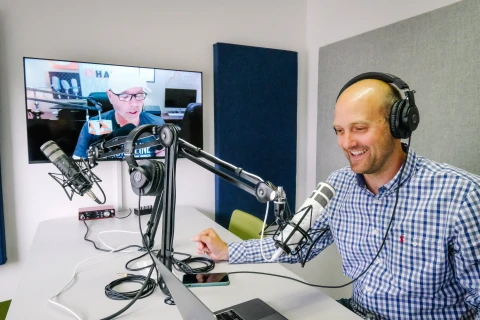Could podcasting be 2023's next post-pandemic tech casualty?
—An article this week by Chris Newbould from agency news outlet Prolific North stood out and grabbed my attention. Perhaps the title was slightly over-dramatic, but as a digital agency owner with our own podcast studio and plenty of first hand experience, I was curious.
As we’re supposedly entering a global economic slowdown that makes news headlines almost daily, it’s true there are casualties in big tech. Few of the big tech companies avoided redundancies in 2022; a trend that’s continued into 2023. From Elon Musk’s very deep and public cuts at Twitter, to lay offs announced by at Amazon, Meta, Shopify and Microsoft among others, these are certainly a change in direction from the hiring bonanza as recent as the pandemic years.
Podcasting has been on a growth trajectory for several years. But there was certainly a rapid acceleration through the pandemic, backed up by Listen Notes’ numbers quoted by Chris in his article. Ease of access was the obvious attraction. Lack of face to face contact another. In 2020 we were all jumping on Zoom and other video calling platforms, with many of these meetings recorded as people realised they no longer needed to furiously scribble across their notepads. At this point, people realised a recorded meeting was basically a podcast, albeit without the public audience and distribution.
I too picked up the pace of our own Clientside Podcast through the pandemic. There was uncertainty for everyone and networking events disappeared in an instant. To this day, not a single person I approached about joining me on my podcast said no.
Fast forward a few years and the truth is, I’ve scaled back on The Clientside Podcast. Hosting a podcast is great fun. It’s easy to do, you meet some great people and I loved geeking out on the tech. But it’s hard work. And repetitive. Sure, you can automate parts of the process, and I felt I had a pretty good workflow from finding and organising guests, planning the shows, recording episodes, transcribing the content and publishing them online. Even after all that though, they need to be promoted; repeatedly. It’s relentless and despite the automation opportunities, it’s still massively time consuming. While we outsourced out editing and transcribing (thank you Matthew) I could never have outsourced researching my guests and planning each episode. Plus, outsourcing costs money, which has to come from, well, the podcast ideally.
Maybe hitting the milestone of 50 episodes felt like an achievement and time for a natural break. After all, many don’t make it past 3 or 4! It feels like we’ve built up a fantastic bank of content and we had some amazing guests. But like any marketing, it needs to focus on your audience, and that audience needs to be earned and grow with your content. There’s so much high quality content, it’s not like people don’t have alternatives (and that includes platforms now like BBC Sounds). It's a hustle.
So is podcasting going to be the next casualty in tech?
No, not a casualty. But a drop in numbers is inevitable. There are only so many listening hours in the day. The excitement of adding a new podcast to your library is soon overtaken by the next playlist, and for all the podcast content out there, it’s the current episodes that people are the most interested in. Podcasts are firmly in our psyche for entertainment and learning, we’re just spoilt for choice in a saturated space. People don’t just listen for the content either. They listen and keep listening for their show’s personalities.
For creators, as there always has been with starting something new, there’s a glass ceiling. It’s there to be broken, but I suspect it’s rather like the music industry. For all the commercial success that the worlds biggest acts achieve, there’s a range of incredible unsigned talent we’ve never heard of, wrestling their way to the top, or simply enjoying their small, more intimate gigs away from the limelight. You make a choice and either go all in to hit the big time, or balance it with other avenues. Just like your favourite band probably did at some point, it's ok to take a hiatus.
Don’t get me wrong. I’m still an advocate for podcasts and we've welcomed several clients new to podcasting into our studio over recent months. But the investment required for regular, high quality content can’t be underestimated. Of course this applies across all your channels, and eventually, the ones with the least friction and the highest gains will rightly win.
For us, we’re still getting an average of 246 monthly downloads (its 2 months since our last episode at the time of writing), with our most popular show attracting 825 unique listens. Small when compared to the heady heights of shows like The Diary of a CEO or the entertaining Shagged Married Annoyed. But like any good quality content, it works on your behalf long after it was created. We don’t need millions of listeners; a few hundred is just fine.
I’ll still be taking the podcast forwards in 2023, but it won’t (can’t) be with the same vigour in 2020. The episodes will be more ad hoc, maybe even opportunistic. I know this infrequency won’t be as well served by the algorithms, but focusing on a less is more approach will keep things ticking over at a more manageable and realistic level.
Podcasting still provides a great channel for sharing your content in a variety of different formats. Download our Ultimate Podcast Planner to help you plan and brand your show and check out our podcast studio for the perfect place to make it a reality.
Learn about our podcast studio
